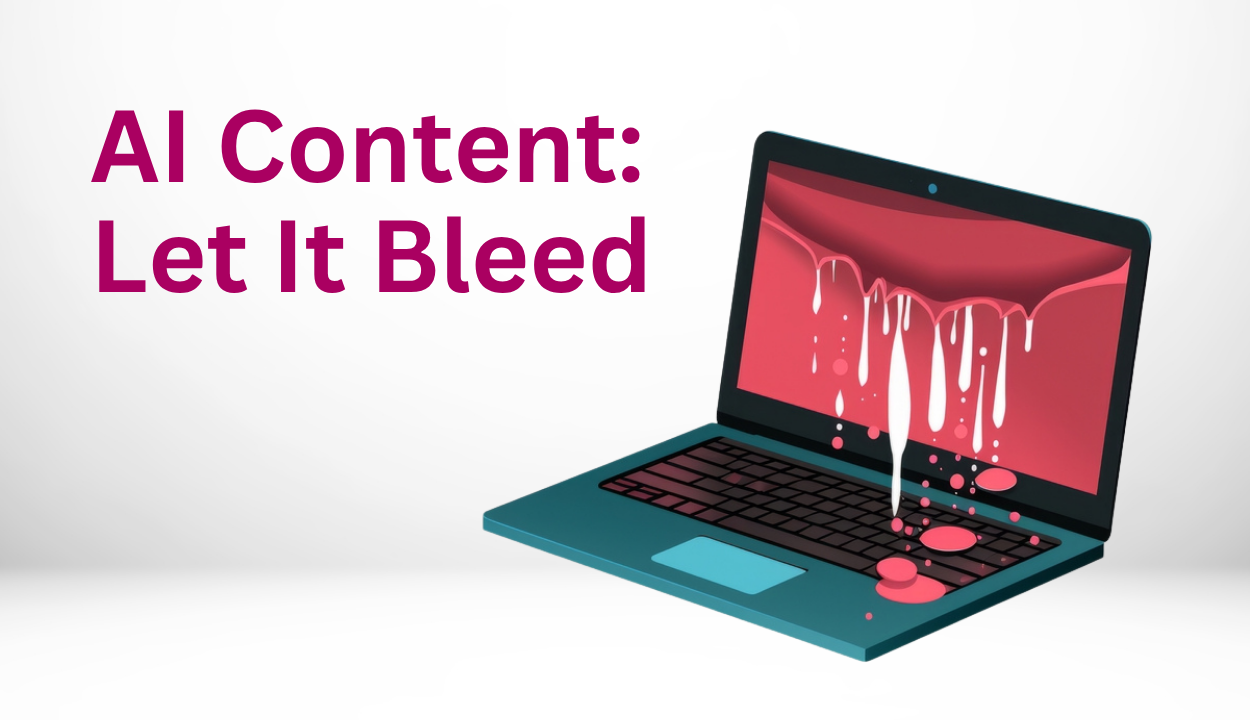AI Writes Fast, But You Still Need to Bleed a Little
AI reduces content creation time by 75%, but its can't replace the heart and soul that brings your content to life.

Hemingway once said, “There is nothing to writing. All you do is sit down at a typewriter and bleed.”
When you sit down to write on your laptop today, AI takes away the bleeding. Instead of bleeding over every word at the keyboard, we’re prompting. We're thinking fast, typing faster and publishing more in less time with less pain. (AI is responsible for a bloodbath in other areas, but that’s a whole different story)
Neil Patel calculated exactly how much time we're saving when using AI to create and publish online content. His study found that creating a piece of content took:
- Humans: 69 minutes
- AI: 16 minutes
That's a 75% reduction in time ...which is almost an hour added back to your day for every article you write.
But here’s the thing: the bleeding is what brings your best work to life. That’s the insight, the unique perspective, and the heart in your story. The blood is what gives your content life. Strip that out, and you’re left with just words without much soul.
The Problem With Fast Content
AI tools can mimic authority and sound informed. I've seen marketing bloggers boast about how it can crank out dozens of posts for you in minutes making your blog full of fresh content. But what you can end up with is generic content that's like everything else online. With more marketers turning to AI for fast content, that's a sea of sameness. On their own, AI tools can't replicate the depth of knowledge, passion and credibility of an expert.
While your competitors are flooding the market with generic AI content, use the same tools to stand out.
Google’s Take: It’s Not About AI, It’s About Intent
Contrary to some concerns, Google isn’t anti-AI. Their position is actually pretty reasonable: automated content isn’t against guidelines, as long as it’s not being used solely to manipulate rankings. They say automation is good and is important to publishing.
What they do care about is quality. Google’s content engine rewards content that demonstrates E-E-A-T: experience, expertise, authoritativeness and trustworthiness. These guidelines emphasizes creating high-quality, reliable content that genuinely serves users.
This is not new to the AI era. It's the way its always been. If you need a refresher, I ran this by Google Gemini to get the latest...
- Experience: This first "E" emphasizes the value of first-hand experience. Your content should demonstrate practical knowledge and real-world application. Share detailed examples, walk through case studies, discuss actual outcomes, and recount personal anecdotes where relevant.
- Expertise: Beyond personal experience, your content should reflect deep knowledge and understanding of the subject matter. Back up your ideas with data, current research, and credible sources such as academic studies or reports from leading industry analysts.
- Authoritativeness: Authoritativeness is about being a recognized and respected voice within your niche. Build a comprehensive author bio that clearly showcases your credentials, relevant experience, and notable achievements. Link to your other published articles, interviews, certifications, or public speaking engagements.
- Trustworthiness: Trust is paramount. Make it transparent who is behind your content and why they are qualified to create it. Be transparent about your sources and, if appropriate, acknowledge limitations. A trustworthy voice not only provides accurate information but also demonstrates responsibility for the truth and integrity of its content.
AI on its own doesn’t hit those marks. Not consistently. Not meaningfully. But you can, with AI’s help. Here’s how I approach content creation with AI:
- Start with a story to tell. Outline your idea, including the key points, supporting stories, and the expertise you bring. Gather quotes, stats, and sources of inspiration. Even if it’s just a collection of loosely connected fragments, you’re already shaping a narrative.
- Let AI do its thing. Use it to conduct background research, spark ideas, and help shape a first draft. You can also tap it for SEO keyword research to guide your content strategy.
- Let it bleed. Now that you have a foundation, it’s time to shape the story. Add personality, anecdotes, experiences, examples, and insights that brings it to life.
- Refine, don’t surrender. Use AI to polish for grammar, clarity, and flow, but be careful. It can sometimes dull your voice and drift back toward the generic. Keep editing to reassert your perspective and make the message yours.
- Validate. I work with ChatGPT, but I often run my near final draft through Claude and Gemini to see if I’ve missed a perspective or if there's a better way to communicate a point. I like Gemini for generating blog visuals too, but that could change tomorrow. (Like everything else in AI.)
With the right inspiration and a couple good edits, AI gets you someplace great, without the bloodshed.





